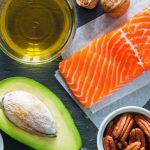 A type of good dietary fat that includes omega fatty acids and is often found in seeds and grains.
A type of good dietary fat that includes omega fatty acids and is often found in seeds and grains.
A triglyceride in which the fatty acids have two or more points of unsaturation. Contains linoleic acid, an essential nutrient found in vegetable fats.
Fats derived from vegetables, lean poultry, fish, and cereal, polyunsaturated fatty acids.
A fatty acid capable of absorbing more hydrogen than most others, typical of vegetable and fish oils.
Polyunsaturated fats are fatty acids that have two double bonds between carbon atoms, thus reducing the number of hydrogen atoms attached. Corn oil, soybean oil, and safflower oil are examples.
Fatty acids found in plant-based foods and fish with more than one double-carbon bond that are liquid at room temperature.
Fats, mostly from plants, with double bonds that can bind to hydrogen; these tend to be liquid at room temperature and are called oils.
This passage discusses the presence of certain types of fats in various oils and nuts, including corn oil, cottonseed oil, safflower oil, sesame oil, sunflower oil, avocado, sunflower seed kernels, sesame seeds, almonds, walnuts, and pecans. These fats have been found to decrease both bad LDL and good HDL cholesterol levels, indicating that they may not be the most optimal choice for one’s diet.
A fatty acid molecule possessing two or more double bonds, recognized for its health benefits when consumed in moderation, is referred to as a polyunsaturated fatty acid. This type of fat can be found in certain vegetable oils, including sunflower, safflower, and corn oil.
Fats that have a low number of hydrogen atoms in their molecular composition are called polyunsaturated fats. These fats are known to help guard against heart disease.
